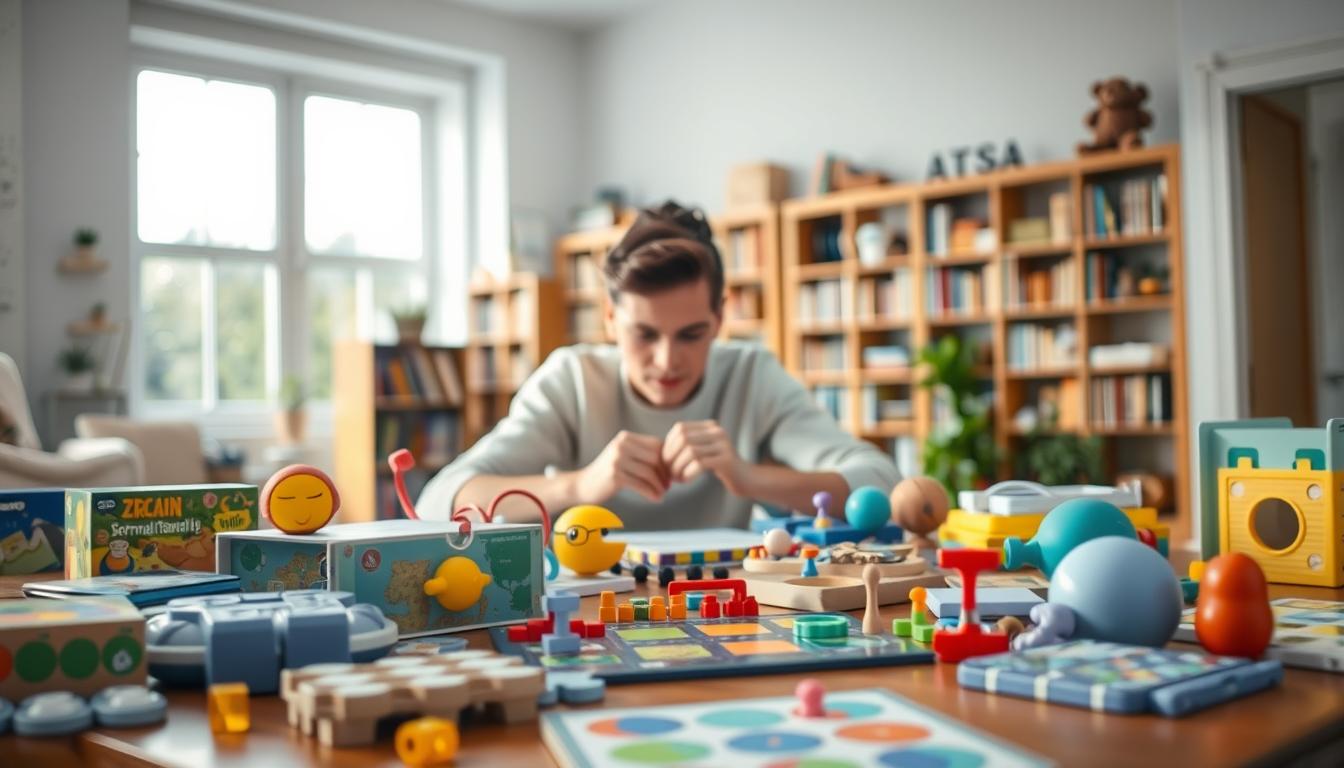In today’s fast-paced world, our minds are constantly bombarded with information, making it challenging to stay focused and mentally agile. Just like our bodies, our minds need exercise to stay healthy and sharp. Engaging in cognitive exercises and mental fitness activities can significantly improve our concentration, memory, and problem-solving skills.
Top-rated brain training games offer an engaging and effective way to challenge our minds and boost our cognitive abilities. These games are designed to be fun and interactive, making mental fitness a enjoyable experience.
Key Takeaways
- Improve concentration and focus with cognitive exercises
- Enhance memory and problem-solving skills
- Engage in fun and interactive mental fitness activities
- Boost cognitive abilities with top-rated brain training games
- Stay mentally agile and sharp in today’s fast-paced world
The Science and Benefits of Mental Exercise
Neuroplasticity exercises are at the forefront of cognitive research, offering insights into brain adaptability. Cognitive enhancement activities have been shown to improve brain function across various age groups.

How Cognitive Training Affects Your Brain
Cognitive training stimulates the brain, promoting neuroplasticity. This process allows the brain to adapt and change, potentially leading to improved cognitive function. Through consistent mental exercise, individuals can strengthen their brain’s ability to process information.
Research-Backed Benefits of Mental Workouts
Research supports the benefits of brain games for adults, including enhanced memory, improved focus, and better problem-solving skills. These benefits are attributed to the brain’s ability to reorganize itself in response to new challenges.
Who Can Benefit from Brain Training
Neuroplasticity exercises are beneficial for individuals of all ages. Whether you’re looking to improve cognitive function or simply maintain brain health, cognitive enhancement activities can be tailored to meet your needs.
By incorporating cognitive training into your routine, you can potentially improve your mental agility and overall brain health.
How to Select Effective Brain Training Games
With the numerous brain training apps available, selecting the most effective ones requires a strategic approach. To make an informed decision, it’s crucial to understand your cognitive strengths and weaknesses, the qualities that define scientifically-designed brain games, and how to strike a balance between challenge and enjoyment.
Assessing Your Cognitive Strengths and Weaknesses
Before diving into brain training, it’s essential to assess your cognitive profile. Memory improvement games might be more beneficial if you struggle with recall, while mind sharpening games could be more effective for enhancing focus. Identifying areas for improvement helps in choosing the right tools.
Qualities of Scientifically-Designed Brain Games
Effective brain training games are grounded in cognitive science. They are designed to target specific cognitive skills, such as memory, attention, or processing speed. When selecting a brain training app, look for programs that are backed by scientific research and have been tested for efficacy.
Balancing Challenge and Enjoyment
A good brain training game should be both challenging and enjoyable. If a game is too easy, it won’t stimulate cognitive improvement. Conversely, if it’s too difficult, it may lead to frustration. The ideal game adapts to your performance, providing an optimal level of challenge.
| Game Feature | Description | Benefit |
|---|---|---|
| Adaptive Difficulty | Adjusts challenge level based on user performance | Optimizes cognitive stimulation |
| Scientific Basis | Designed based on cognitive science research | Ensures efficacy in cognitive improvement |
| User Engagement | Features that make the game enjoyable | Encourages consistent practice |
Top-Rated Brain Training Games for Different Cognitive Skills
Cognitive skills such as memory, focus, and problem-solving can be improved with targeted brain training games. These games are designed to challenge the brain and enhance cognitive function. With numerous options available, both digitally and traditionally, individuals can choose games that suit their preferences and cognitive needs.
Memory Enhancement Games
Memory enhancement games are crucial for improving cognitive function. These games challenge the brain to recall patterns, sequences, and objects.
Digital Apps and Platforms
Digital apps like Lumosity and Peak offer personalized memory enhancement games. These platforms provide a variety of exercises tailored to individual cognitive needs.
Traditional Games and Activities
Traditional games such as Memory Match and Concentration also enhance memory. These games involve matching pairs of cards or objects, improving recall and recognition.
Focus and Attention Improvement Games
Games that improve focus and attention are vital for cognitive development. They help individuals concentrate and maintain mental discipline.
Digital Apps and Platforms
Apps like Focus@Will and StayFocused provide music and tools to improve concentration. These digital tools help users stay on task and avoid distractions.
Traditional Games and Activities
Traditional activities such as meditation and reading can also enhance focus. Engaging in these activities regularly can improve attention span.
Problem-Solving and Logic Games
Problem-solving and logic games are essential for cognitive development. They challenge the brain to think critically and make informed decisions.
Digital Apps and Platforms
Digital platforms like Sudoku and chess apps offer logic-based games. These games improve problem-solving skills and strategic thinking.
Traditional Games and Activities
Traditional games such as chess and bridge also enhance problem-solving skills. These games require strategic thinking and planning.
Processing Speed and Reaction Time Games
Games that improve processing speed and reaction time are vital for cognitive function. They help individuals react quickly and make fast decisions.
Digital Apps and Platforms
Apps like Reaction Time and Quick Brain provide exercises to enhance processing speed. These digital tools offer timed challenges to improve reaction times.
Traditional Games and Activities
Traditional games such as reaction ball games and video games can also improve processing speed. These activities require quick reflexes and fast decision-making.
| Cognitive Skill | Digital Apps/Platforms | Traditional Games/Activities |
|---|---|---|
| Memory Enhancement | Lumosity, Peak | Memory Match, Concentration |
| Focus and Attention | Focus@Will, StayFocused | Meditation, Reading |
| Problem-Solving and Logic | Sudoku, Chess Apps | Chess, Bridge |
| Processing Speed and Reaction Time | Reaction Time, Quick Brain | Reaction Ball Games, Video Games |
Creating an Effective Brain Training Routine
Creating an effective brain training routine involves several key steps that can help you achieve your cognitive goals. By following a structured approach, you can maximize the benefits of brain training games and improve your overall mental agility.
Step1: Set Clear Cognitive Goals
To start, it’s essential to define what you want to achieve through brain training. Are you looking to improve your memory, enhance your focus, or boost your problem-solving skills? Setting clear cognitive goals will help you focus on the most relevant mental agility challenges and attention and concentration games. For instance, if you’re preparing for a competitive exam, you may want to focus on games that improve your attention and concentration.
Step2: Establish a Consistent Training Schedule
Consistency is key when it comes to brain training. Establishing a regular training schedule will help you stay on track and ensure that you’re making progress towards your cognitive goals. Aim to dedicate a specific time each day to brain training, even if it’s just 15-20 minutes. You can use brain training games that offer personalized training plans to help you stay consistent.
Step3: Track Your Progress and Results
Tracking your progress is crucial to understanding the effectiveness of your brain training routine. Many brain training games offer progress tracking features that allow you to monitor your improvement over time. Use these features to identify areas where you need to focus more attention and adjust your training routine accordingly.
Step4: Adjust and Diversify Your Training
As you progress in your brain training journey, it’s essential to adjust and diversify your training routine to avoid plateaus. This can involve introducing new mental agility challenges or switching to different types of attention and concentration games. By keeping your training routine fresh and engaging, you can continue to challenge your brain and achieve sustained improvement.
By following these steps and incorporating brain training games into your daily routine, you can create an effective brain training regimen that helps you achieve your cognitive goals and improves your overall mental agility.
Conclusion: Making Brain Training a Lifelong Habit
Embracing cognitive enhancement activities as a regular part of your routine can have a significant impact on your mental fitness. By incorporating brain games for adults into your daily schedule, you can continue to challenge and improve your cognitive abilities.
To make mental fitness activities a lifelong habit, start by setting achievable goals and tracking your progress. This will help you stay motivated and engaged in the cognitive training process. Consistency is key when it comes to brain training, so establish a regular routine that works for you.
As you continue on your cognitive training journey, remember to mix up your mental fitness activities to keep things interesting and prevent plateaus. With persistence and dedication, you can enjoy the many benefits that brain training has to offer, from improved memory and focus to enhanced problem-solving skills.
By making cognitive enhancement activities a priority, you can take control of your mental fitness and enjoy a sharper, more agile mind well into the future.
FAQ
What are brain training games, and how do they work?
Brain training games are cognitive exercises designed to improve mental fitness, memory, attention, and processing speed. They work by challenging the brain with various tasks and activities that stimulate neuroplasticity, helping to build cognitive reserve and improve overall brain function.
Are brain training games scientifically proven to be effective?
While some brain training games are backed by scientific research, the effectiveness of others can vary. Look for games and programs that are developed in consultation with neuroscientists and cognitive psychologists, and that have been tested in clinical trials.
Can brain training games really improve my memory and cognitive function?
Yes, certain brain training games and cognitive exercises have been shown to improve memory, attention, and processing speed in both children and adults. However, the extent of the improvement can depend on the type and quality of the training, as well as individual differences in cognitive ability.
How often should I play brain training games to see results?
Consistency is key when it comes to brain training. Aim to practice cognitive exercises regularly, ideally 3-4 times per week, for 15-30 minutes per session. This can help to stimulate cognitive improvement and reinforce new neural connections.
Are there brain training games suitable for older adults or people with cognitive impairments?
Yes, there are brain training games and cognitive exercises specifically designed for older adults or individuals with cognitive impairments, such as dementia or Alzheimer’s disease. These programs often focus on compensatory strategies and cognitive support.
Can I use brain training apps as part of my cognitive training routine?
Yes, brain training apps can be a convenient and engaging way to incorporate cognitive exercises into your daily routine. Look for apps that offer a variety of tasks, track your progress, and provide personalized feedback.
How can I assess my cognitive strengths and weaknesses before starting a brain training program?
You can start by taking online cognitive assessments or consulting with a healthcare professional. This will help identify areas where you may need improvement, allowing you to tailor your brain training program to your specific needs.
Are there any traditional games or activities that can be used for brain training?
Yes, traditional games like chess, Sudoku, and crosswords, as well as activities like reading, puzzles, and learning a new skill, can be effective for brain training. These activities challenge the brain and promote cognitive stimulation.
Share this content:
